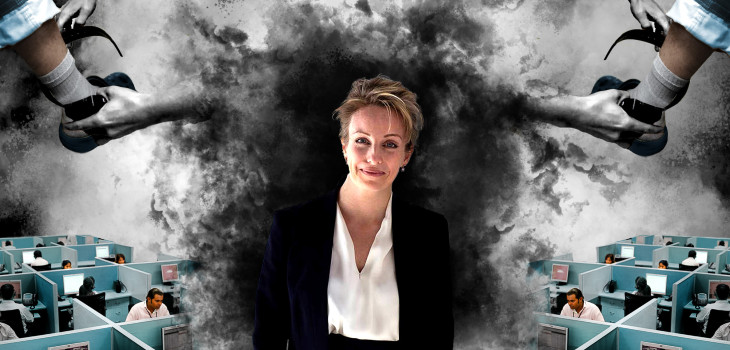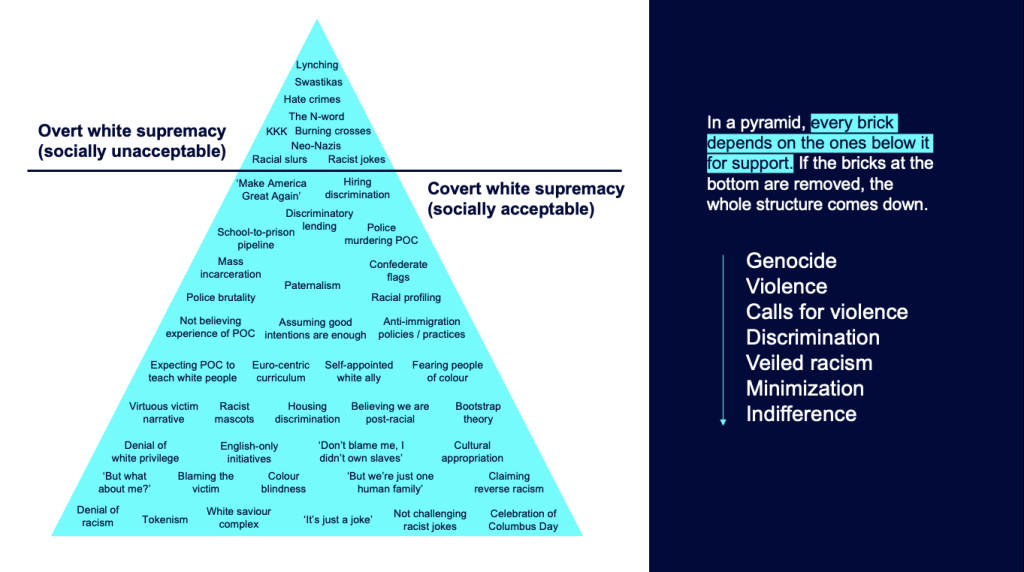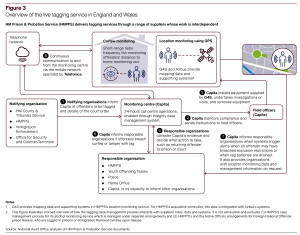Shackles & Shambles: Capita and the electronic tagging boom

[Warning: mentions of suicide in the ‘benefits’ section]
We are in the midst of a dramatic expansion of electronic tagging in the UK, but this is not without a strong pushback. Campaigners from Bail for Immigration Detainees, Migrants Organise, and Privacy International – among others – have been working to raise awareness and drive action to end GPS tracking and Capita’s role in it. This investigation was carried out in conversation with those groups to support that campaign. For information on how you can get involved, see the appendix at the end of this report.
Summary
- Outsourcing giant Capita continues to win multi-million pound government contracts despite its litany of failures across a range of public sectors.
- The company has held the contract to manage electronic tagging services in the UK since 2014. The government is in the midst of a dramatic expansion of electronic monitoring despite concerns from oversight bodies about whether this is justified. Channel-crossing asylum seekers are a particular focus for inclusion in its scope.
- A growing number of UK police forces and government agencies are signing up to COSAIN, Capita’s social media listening tool. COSAIN has been used to monitor activism and will now be used to tackle benefits fraud.
- Capita has been meeting with government via the Whitehall Industry Group (WIG), a ‘non-lobbying charity’ made up of corporations and civil servants, of which it is a member.
- Capita’s largest shareholder (owning about 19% of the company) is Schroders, an asset management giant whose biggest ultimate beneficiary is the Schroders family.
Company Overview
It can be hard to grasp just how deeply Capita is embedded in British society. A perennial recipient of government and private contracts, it was once among the largest “outsourcing” companies in the UK, offering an array of management and technical services across different sectors. But with the rise of privatisation came greater competition, and in recent years the company has been working hard to rebrand itself as a data and technology specialist.
Capita says it provides a variety of “digital solutions” to the government and companies. Concretely this means automated processing systems, online forms, user portals, and e-learning courses. It has been a major beneficiary of the digitisation of administrative systems in the UK, and increasingly, the automation of decision-making.
It processes medical data, benefits claims, and student loan applications. It collects license fees for the BBC, and the London Congestion Charge for TFL. It runs buffers between the public and the government or companies known as “contact centres”. Knowingly or not, the public regularly encounters Capita, most directly via call centres for local councils or for major brands like O2, Tesco Mobile, the BBC, Irish Water, and The National Trust. It also runs the RSPCA’s National Control Centre (NCC), which handles complaints about the treatment of animals and operates a system that determines the priority of cases.
Founded in 1984 as an offshoot of the Chartered Institute of Public Finance and Accountancy (CIPFA), Capita plc initially focused on providing services within local government. It is now listed on the London Stock Exchange and headquartered at 65 Gresham Street in the City of London. The firm conducts its activities through two divisions: Capita Public Service, which handles government contracts, and Capita Experience, which works with the private sector. Of these two, Capita’s government work is the most lucrative. The UK is its primary source of revenue by far, although it also works in Europe, India and South Africa.
Everyday encounters with Capita
The pervasive nature of Capita is best illustrated through a (fictionalised) account of Julia's day:
Julia works for a London local authority. This morning, all staff have to participate in a training exercise; the training was developed by Capita plc.
Julia has booked the afternoon off to drive her mother to a medical appointment in Kings Cross. She was unable to avoid the congestion zone, and will have to pay the fee - processed by Capita. When the pair arrive to the NHS clinic, they provide personal information to staff, data which will also be handled by Capita.
Once home, Julia calls her council about a problem with her mother’s benefits. The decision about the benefits was made by an automated system supplied by Capita, and the call centre is run by the company too. Concerned about her finances, she decides she needs to reduce her spending and gives her mobile provider a call to change her plan. The people on the other end of the line work for Capita too.
Finally, after a long day, Julia flops down in front of the TV – the license fee for which will be processed by….Capita.
Cockups & Cruelty: Capita’s public sector contracts
Famously dubbed ‘Crapita’ in the early 2000s by Private Eye magazine for its record of poor performance, the company is no stranger to public criticism. If anything, it’s often been the well-rewarded fall guy for rapacious government policies going back to the early days of New Labour. So, it is perhaps unsurprising that it has repeatedly won state contracts despite its widely reported failures.
According to outsourcing analyst Tussell, between January 2015 and September 2021, Capita was awarded 1085 public sector contracts, totalling £6.5bn.
Here we take a look at Capita’s major current and historic deals across a range of public sectors.
 Electronic Tagging: hi-tech balls & chains
Electronic Tagging: hi-tech balls & chains
Capita has held the contract to tag people with electronic ankle bracelets across the country since 2014, in a deal worth £229m. A three-year extension of the contract until 2024 was granted at a cost of £114m. Capita staff are responsible for fitting people with tags, collecting location data, reporting suspected breaches, and supplying this data to government agents. In its job ads, Capita says the work would suit a range of people, “whether you’ve previously worked as a postie, a broadband engineer, or a door-to-door salesperson”. G4S, a long-time border profiteer, supplies the bracelets.
The government is currently on a massive expansion drive for the use of electronic monitoring (EM) to a variety of groups: suspects on bail, ex-prisoners out on license, migrants released on bail from immigration detention, or those serving community orders or suspended sentences. Ministry of Justice (MOJ) figures for 31st March 2023 reveal that 17,350 people in the UK were wearing an electronic monitoring device at that date, an overall increase of 13% on the previous year.
In particular, the number of people fitted with alcohol monitoring tags is rapidly increasing, with a 73% increase in 2023 on the year before. These devices are used against people convicted of alcohol-related offences; wearers are sanctioned if the device detects alcohol in their sweat, with penalties ranging from fines to imprisonment.
Whilst tags are not meant to be imposed on those with alcohol dependencies, one MOJ report for the rollout refers to offenders with “an alcohol misuse problem”, citing the case of a man whose life was reportedly saved by the tag, as, “alcohol abstinence gave him a foundation to engage with intervention and reduce his anxiety”. Addiction experts have questioned exactly how the government is ensuring that people with dependencies are not among those being tagged, and have warned of the possible psychological impacts of this technology on people dealing with alcoholism. In particular, they require people to cut out alcohol ‘cold turkey’ without support, which may do more harm than good, while such close monitoring can fuel the anxiety and paranoia that alcohol is used to alleviate.
Migrants are another major target of this coercive campaign. The 2016 Immigration Act specified that electronic monitoring could be imposed as a condition of immigration bail and that that Foreign National Offenders must be tagged unless this is impractical or would breach their Convention rights (as determined by the Home Office). In addition, from June 2022 to December 2023, the Home Office ran an “Expansion Pilot” of the tagging programme for Channel-crossing asylum seekers, thereby greatly expanding the number of migrants facing electronic tagging. The most recent (September 2023) Home Office data shows 4,316 people on immigration bail were electronically monitored that month; a 63% increase on the previous year.
Elisa Imperilee-Smith, Communications Manager at Bail Immigration Detainees, provided insight into the impact of the rollout on the project’s clients:
“Despite medical evidence, vulnerable people, including torture and trafficking survivors, are tagged routinely by the Home Office and we have never seen a case where the Home Office have applied exemptions to protect human rights at the point of being granted bail.
We frequently refer clients for public law challenges to remove tags based on their human rights, the success of these challenges demonstrating the problematic nature of the decision to impose tagging in the first place.”
As is so often the case, technology used on migrants subsequently gets rolled out on a larger scale, and a 2023 MOJ document indicates that the government plans to rapidly expand the electronic monitoring in general, to “nearly double the caseload by 2025”.
One person who spoke with Corporate Watch – who had been tagged and was on curfew as a condition of bail – described it as ‘a ball and chain’. He emphasised that the technology itself often fails, with the person on tag bearing the consequences:
“They called me up at one in the morning… two in the morning…three in the morning consecutively, asking if I’d just gone outside…I was like ‘it’s one in the morning, I’m in bed’…. I went back to bed, and it kept ringing again and again.”
For the next five months, he avoided going too near the walls of his home so as not to trigger the tag’s sensors, until he was acquitted and the device was removed – although not before spending a further week on tag post-acquittal.
One person on immigration bail, who spoke to Bail for Immigration Detainees (BID), described the stigma and psychological impact of being on tag. In particular, they spoke of the hell of having to sleep with a device charging on their leg, which they said took up to four hours to charge:
“you can’t be comfortable in bed… when you move, the charger gets disconnected, it starts vibrating and making noise… it’s torture.”
Media reports indicate that Capita will be replaced by the previous award holder, Serco, in May 2024 – despite the latter having left mired in scandal. In 2021, an investigation by the Serious Fraud Office found that Serco had defrauded the MOJ by hiding the real value of profits made during its EM contract. The company was forced to pay nearly £23m in penalties and costs. This is on top of an earlier £70m civil settlement with the MOJ for overcharging its tagging services by invoicing for people who had died, gone back to prison, left the country, or were simply not meant to be monitored. Serco’s new contract is worth £200m and lasts until 2030, with the possibility to extend for an extra two years. The message is clear: if you’re a major contractor, it doesn’t matter how much you cock up – or how greedy you are – you’ll still be given multi-million-pound deals if you just wait for the media outrage to die down.
Other winners in the electronic tagging boom
G4S’s contract to supply the ankle bracelets has been renewed for a sum of £175m and is also scheduled to go on until 2030.
Ernst and Young are being paid £13.5m for 18 months’ work as consultants for the scheme’s expansion; this contract expires in December 2024.
Another beneficiary is MadeTech, a relatively small, UK company specialising in technology for public authorities. MadeTech has been appointed the middleman to oversee the transfer of the contracts to the new suppliers, for which it will be paid £6m.
The government is charging ahead with the expansion of tagging in the face of major concerns raised by oversight bodies about doing so. A 2017 report by the National Audit Office found that the MOJ’s case for the large-scale expansion of EM using GPS had not been proven. By 2022 the justification was still not apparent, with a Commons Public Accounts Committee report warning that ‘the Ministry and HMPPS [prison and probation service] still do not know what works and for who, and whether tagging reduces reoffending’; it emphasised the ‘serious risks’ associated with expansion. Far from taking the feedback on board, by criminalising people seeking refuge, the government has simply found another way to try to justify the rollout – and the associated corporate bonanza.
Some of the concerns stem from the mismanagement of the Gemini system, which HMPPS had tasked Capita with developing as part of a bid to overhaul the management of EM in the UK. Gemini was intended to be a simplified, automated platform to monitor tag wearers. Following considerable delays, the project was scrapped in 2021 – though not before costing the taxpayer £98m (plus £10m in ‘remediation work’). A 2022 National Audit Office report found that there had been three formal disputes between HMPPS and Capita over the course of the project, and that Capita’s ‘inability to resolve defects was a key contributor to its failure on the Gemini case management system’.
In an ironic twist, Capita has partnered with a charity called Project Remake to give paid internships to ex-offenders; perhaps some of the very same people the company has been tagging for months on end.
 Policing & immigration
Policing & immigration
Beyond electronic tagging services, Capita has a history of providing dystopian surveillance “solutions” to a succession of right-wing British governments.
One piece of Capita software reportedly in widespread use among UK police forces is its audiovisual interview recording tool, EvidenceWorks®. Another product is COSAIN, a “social media listening platform” that the company supplies to the police and possibly other security services. Capita reports that COSAIN is now being used by “the majority of UK police” to gather intelligence from social media, and it was reportedly “deployed successfully” during the COP26 in Glasgow.
While its use to monitor dissent is not overtly mentioned in Capita’s promotional material, a little digging gives an indication of COSAIN’s significance to the police as an activist surveillance tool:
“This software allows a number of social media sites to be accessed/monitored to extract relevant intelligence which may support or corroborate upcoming action by a variety of activist groups and/or indicate possible witnesses to crimes.”
Spending reports show the Scottish Police Authority paid £151k for a year’s subscription to COSAIN until late March 2024, while Avon & Somerset Police paid £64.8k for two years until June 2025. COSAIN has also been used by the RAF, the British Transport Police, and bizarrely, the Food Standards Agency.
In an even more disturbing turn of events, the Department for Work and Pensions (DWP) has just struck a deal with Capita to use COSAIN to tackle benefits fraud. In its 2022 report, ‘Fighting Fraud in the Welfare System’, the Department tried to set out the threats of internet-based fraud. Among other things, it argued that social media platforms were being used to share “instruction manuals for fraud”, claiming there had been a “surge” in scamming advice during the pandemic, and that it would increase private sector involvement to tackle the issue. COSAIN’s potential as a tool to snoop on individual claimants – for example, to check whether their lifestyle is in keeping with what the DWP would expect of a benefits claimant – is particularly disturbing.
Lucie Audibert, Senior Lawyer & Legal Officer at Privacy International, told us:
“It’s not a big surprise that Capita is rolling out more of its surveillance systems into the UK government. But the latest instance, selling social media surveillance systems to the Department of Work and Pensions, is just appalling. Stalking benefits recipients to check that their social media life shows them to be “poor enough” to deserve continued receipt of benefits is just cruel, and further expands the all-seeing eye and controlling hands of the government on vulnerable populations.”
At least some of the police contracts with COSAIN were made via Capita’s (now dissolved) subsidiary, Barrachd Ltd.. The technology is being promoted by “career detective”, Neil Cunningham and ex-cop Phil Aldred. The latter is a former business lead for the Metropolitan Police’s Counter Terrorism Command unit, where he supported the “government narrative on online terrorism and extremism”.
In the area of immigration, Tascor – a Capita subsidiary – held the “escorting” contract with the Home Office from 2011 to 2018, and ran short-term holding facilities at airports and ports before it lost out to Mitie in the current escorting deal. “Escorts” is the Home Office euphemism for the guards who enforce deportations and transport detainees between detention centres, courts, prisons and hospitals. A 2018 inspection report outlined the humiliating treatment and excessive restraint Tascor officers used against deportees; other reports show assault, and guards making “animal noises”.
Capita held a separate contract to communicate with individuals about their immigration status on behalf of the Home Office from 2012 to 2016. This contract allowed the firm to benefit from bonuses for exceeding deportation targets in Windrush cases. It was later found that the government had detained or deported a minimum of 164 Windrush migrants in error, as they had a legal right to remain in the UK.
Military
According to Capita’s annual report, 20% of the firm’s revenue from state contracts comes from its defence, fire and security work (income from electronic tagging comes under its ‘justice’ line).
In 2012, the Ministry of Defence (MOD) awarded the company a ten-year contract to run recruitment campaigns for the army using bespoke software. But the contract was roundly criticised as a failure after the National Audit Office found that Capita had fallen short of recruitment targets by an average of 30% per year. At the time, the MOD said that it would withhold £26m due to the company by way of penalties, yet – unbelievably – Capita had the contract extended in 2020 by a further two years, for a sum of £140m. In 2014, the firm was awarded another ten-year, £400m agreement with the MOD to run infrastructure at military bases. However, this was cancelled in 2017 (to take effect two years later) after another National Audit Office report found the contract to be ill-thought out and not cost-efficient.
Despite these failures, in 2021 Capita won what, according to Tussell, was the largest contract awarded to outsourcing companies at the time. The deal is worth £1.3bn over twelve years, and is to deliver Project Selborne, a training programme for the navy and marines. To this end, Capita runs Team Fisher, a consortium which consisted of Israeli arms manufacturer, Elbit Systems UK; US arms company, Raytheon UK; Fujitsu (the company behind Horizon, the software at the centre of the Post Office Horizon miscarriage of justice); and the University of Lincoln.
However, Elbit has recently been cut out of the deal by the MOD due to “revised operational sovereignty standards” – although this was not before having been paid £29m for a year of the contract. A company called Metaverse VR has assumed the role previously taken by Elbit (seemingly no relation to Meta).
According to financial databases, the Israeli Ministry of Defense has been a ‘recent’ Capita customer, and their relationship goes back to 2012. The nature of the products or services provided is unclear. Capita also counts arms company giants Lockheed Martin and BAE Systems as former customers.
Education
Capita currently holds a seven-year, £107m contract to manage the administration, processing and marking of primary school SATs tests. In 2022, it managed to bungle the task in its first year by losing scripts, resulting in thousands of pupils having at least one result delayed. Meanwhile, Capita’s portal crashed, causing delays in schools accessing the results. When frustrated and anxious teachers tried to call the helpline, many were left waiting for hours to speak to an advisor.
Qualifications regulator, Ofqual, carried out an investigation and managed to locate 2,000 missing scripts at Capita’s scanning site. It criticised “insufficient supplier resourcing”, while the Standards and Testing Agency described “challenges to the recruitment and retention of Capita staff to operate the helpline”. SAT markers weren’t happy either, criticising the 50% drop in wages after Capita assumed management of the system: some teachers estimated that they were subsequently paid less than the minimum wage for the work.
Capita was fined for the delays and lost papers, however, the government opted to waive most of the fine and charge the company just £1.3m for the fiasco, ostensibly on the grounds that Capita needed resources to improve its performance (note: the company made £76m in profits the previous year).
Did it improve in 2023? Not much, with yet another technical glitch in Capita’s online portal resulting in teachers being locked out of the system, which delayed marking and forced them to catch up over half-term.
Last year, Capita’s 27-year deal to administer the Teacher’s Pension Scheme came to an end after it lost the bid to Indian firm, Tata Consultancy Services. An investigation by Schools Week publication found that administrative failures in recording full employment histories mean that teachers will miss out on up to tens of thousands of pounds’ worth of pension unless their past employers correct the record; the time lapse will make this task particularly complex. The final seven years of Capita’s contract cost the taxpayer over £90m.
 What is staggering about these stories is that Capita already had terrible form in the field of education. Readers in their thirties may remember having been given a Connexions Card at school or college. Capita was hired by the New Labour government in 2002 to deliver the infamous card, which gave 16-18 year olds “points” for attending lessons which converted into discounts for major brands like Blockbuster and Miss Selfridge. The scheme was an abject failure; by mid 2004, only 3.7% of 16-19 year olds had actually redeemed points. The contract with Capita, valued at £109.7m over seven years, was axed in 2007 – a year earlier than planned.
What is staggering about these stories is that Capita already had terrible form in the field of education. Readers in their thirties may remember having been given a Connexions Card at school or college. Capita was hired by the New Labour government in 2002 to deliver the infamous card, which gave 16-18 year olds “points” for attending lessons which converted into discounts for major brands like Blockbuster and Miss Selfridge. The scheme was an abject failure; by mid 2004, only 3.7% of 16-19 year olds had actually redeemed points. The contract with Capita, valued at £109.7m over seven years, was axed in 2007 – a year earlier than planned.
Health
Capita holds the contract to provide services to NHS primary care practitioners, a £330m deal which it has enjoyed since 2015. The seven-year contract was extended by a further three-year term in 2022 for another £94m, despite scathing criticisms from professional bodies in the sector.
As part of the deal, Capita is responsible for administering pension payments to GPs; handling contracts for pharmacies and GP surgeries; storing medical records; managing the list of qualified NHS practitioners; inviting patients to cervical screening tests; processing payments for eye tests; and providing stationery and syringes to NHS practitioners.
Just a year into the contract, NHS England was concerned enough to put the majority of these services under formal review. It found that the company had failed to deliver and that Capita had put “primary care services and patients at risk”. The National Audit Office concluded that Capita bore responsibility for a range of serious failures, including significant delays in the transfer of patient medical records; incomplete pension records for GPs; long delays to new pharmacies or practitioners being approved; a significant number of missing and inaccurate opticians’ payments; and causing widespread delays in new patient registration letters.
In addition, it criticised Capita for wrongly informing 87 patients that they were no longer part of the cervical screening programme, providing unclear instructions on treatment following a scan, and failing to send out nearly 2,000 cervical screening test letters on the required date. Two years later, that last mistake was made again, and on a far larger scale: Capita had neglected to send 48,000 letters with cervical screening appointment dates and results.
As with the SAT debacle, the firm had apparently not expected any issues with its performance, and – having laid off workers and closing many of the customer support centres it inherited – it buckled under the volume calls it received by frustrated NHS staff. Bizarrely, Capita continued to close all but two of the 38 support sites it had acquired responsibility for, even after NHS England had asked it to stop closing sites. Yet NHS England itself had brought Capita in as part of a cost-cutting drive with the aim of reducing primary care support service costs by 40%, so NHS England senior executives bear a significant share of responsibility for the abysmal state of affairs.
Benefits
Capita has held the contract to carry out Personal Independence Payments (PIP) assessments (benefits for people with a disability or health condition) since 2012. The original deal was valued at an estimated £210m a year; in September 2023 Capita won the contract again for another five years for a reported £565m. Capita will be responsible for carrying out PIP assessments and Work Capability Assessments (used to establish entitlement to Universal Credit and Employment Support Allowance) for the Midlands and Wales on behalf of the DWP, and for Northern Ireland on behalf of the Department for Communities. For the other regions, the job went to Serco, Ingeus and Maximus UK (owned by US healthcare outsourcing firm, Maximus Inc.)
Capita’s latest contract was awarded despite the backlog of PIP assessments growing so huge under its earlier deal that some claimants with terminal conditions died before receiving any of the benefits they were owed. In February 2014, the National Audit Office – now quite familiar with Capita’s record – carried out a review and found a backlog of 92,000 claims due to be assessed by Capita and Atos (the latter no longer holds the contract). Eventually, DWP staff were recruited to speed things along.
In 2016, undercover reporting by a mental health nurse revealed unprofessional conduct and outright corruption in the carrying out of PIP assessments, with Capita’s then-Chief Medical Officer Richard Peters telling assessors to “forget your mental health background and park it to one side” as they needed “to be doing as many assessments a day as you can possibly manage”. Peters has since gone on to become Regional Medical Director at Goldman Sachs.
The five years leading to October 2022 saw the success rate of new PIP applications decline from 70% to 50%. Capita faced heavy criticism in particular in Northern Ireland over distressing and unduly harsh assessment processes, and failures that led to an inappropriately high number of applications being rejected – a criticism that was upheld by the Public Services Ombudsman in 2021. It also comes several months after a coroner’s finding that Capita’s PIP assessment process was “the predominant factor and the only acute factor” that led to young mum Philippa Day taking her own life in 2019. 28 “systemic errors” by Capita and the DWP had been found in the handling of her case.
Capita also supplies technology to local authorities for automated benefits processing, which the company says reduces the processing time from 25 to 3 minutes. Given the concerns about the quality of decision-making by Capita as it is, the potential risks of vesting machines with the task of making decisions that could have profound impacts on the lives of vulnerable people are painfully obvious.
Last year, the Student Loans Company awarded Capita a new contract to carry out needs assessments for students in receipt of the Disabled Students’ Allowance (DSA) for much of the country and to supply resources to the students. The value of the deal is £200m, and lasts five years. And, as well as national-scale contracts, Capita is regularly hired by local councils to provide them with software to manage housing stock, or “portals” for social housing tenants to pay rent or report complaints.
Finances
By 2016 Capita had accumulated significant debt and a huge pensions deficit, and entered into a crisis period. It had overreached: through its strategy of relentless acquisitions, more and more contracts needed to be fulfilled, all while it paid out unsustainable dividends to shareholders. In other words, they got greedy.
Under the management of new CEO Jon Lewis, Capita implemented a strategy to dispose of many of its subsidiaries, suspend dividend payments, and re-invent itself as a tech and data specialist. The change in approach was given added impetus by the collapse of Carillion, another outsourcing firm (albeit smaller than Capita) that crumbled under the weight of its debt in early 2018, with devastating consequences for employees and contractors.
Capita has been ditching significant assets since that time, selling eight businesses in 2022 alone and generating £100m in sales (or “disposal proceeds”) from some of its dozens of subsidiaries in 2023. Notably, it has just sold its majority stake in Fera Science, its biotech joint venture with DEFRA, to Bridgepoint Group (see our recent report on Bridgepoint here). This represents another move away from non-core business operations and is expected to generate an additional £62m for Capita.
While the firm’s share price has never quite recovered from the beginning of the crisis, those measures have kept the company profitable. Annual accounts show that Capita’s profits have increased by 38% from 2016 until the end of 2022 (from £42.3m to £76m) despite a 60% decline in reported revenue (from £4,900m to £3,015m). It remains to be seen if the picture will be so rosy at the close of this financial year, after a major ransomware attack led to at least 90 of its customers reporting data breaches and is expected to cost the company up to £25m.
Capita’s profitability has also been the result of an aggressive cost-cutting drive, and indeed its workers are clear casualties of the company’s ‘turnaround’. In 2016, Capita said it would cut 2,000 jobs, replace some staff with robots, and move more work to India – where wages are considerably lower than in the UK. It said these measures would mean that it could avoid reducing the dividends paid to shareholders.
Employing 70,000 people around the time of Jon Lewis’ inauguration in 2018, the firm has since drastically cut back to 43,000 staff. At the height of the COVID-19 pandemic, management said it would close a third of company offices permanently, moving staff to more flexible home working regimes. Then in November 2023, Capita announced plans for another big round of job cuts involving 900 employees, which it claimed would save the company £60m a year. Given Capita’s record when it had a much larger workforce, this doesn’t bode well for the quality of future services.
A 2019 study by the Centre for Progressive Policy (CPP) and the All-Party Parliamentary Group (APPG) on Inclusive Growth looked into the employment practices of the top 25 UK employers. It ranked Capita as the worst. Among other things, the study measured diversity, pay and benefits, terms of employment, working conditions, voice and representation. The findings are reinforced by the experience reported by SATs markers.
Lobbying
Capita’s revenues really first started to shoot up in the early years of the New Labour government. By the mid-2000s, it had racked up the state contracts and its share price was rising faster than any other UK company. It was against this backdrop that the scandal broke that Capita’s founder and former chair, Sir Rod Aldridge OBE, had secretly provided £1m to New Labour in loans rather than donations as a way to avoid disclosure. Since then the rules have changed, but has the sleaze?
Recent Cabinet Office data shows that Capita met with the Permanent Secretary for the Cabinet Office, Alex Chisolm in a meeting last summer. The meeting was also attended by fellow tagging profiteers Ernst & Young and Serco, as well as benefits assessor Maximus UK. In all, 13 companies attended under the banner of the Whitehall & Industry Group, the purpose of which was to launch a “WIG-drafted procurement playbook”. Despite holding private meetings with government officials, WIG calls itself an “independent, non-lobbying charity” and is made up of around 245 corporate, state and ‘not-for-profit’ members. Just a few days after that event, Chisolm – who is in fact a patron of WIG – met with the organisation again to meet the new CEO of the group.
WIG offers its members leadership programmes, mentoring, talks – and most critically, networking. They are also eligible for what it calls an “organisational raid”. Far less exciting than it sounds, one member of the group basically pays for another to come and help improve their prospects and performance. However, these ‘raids’ cost up to £15k each, and all the examples provided appear to be companies or charities which have paid for meetings with the public sector, such as the Department for Levelling Up, Housing and Communities ‘raiding’ Deloitte; the Metropolitan Police supporting John Lewis Partnership; and the London Borough of Southwark supporting Crisis.
WIG’s leadership and patrons are made up of top civil servants (Alex Chisolm; Cabinet Secretary and Head of the Civil Service, Simon Case; and former a Home Office Director General, Charu Gorasia), as well as council and university heads and CEOs.
Another way in which Capita has had the ear of politicians is by sponsoring panels at party conferences. Last year it sponsored a talk on defence at the Labour Party Conference, the aim of which was to “look at Labour’s plan for defence and consider the new challenges and opportunities presented by technological innovation”. Among the panellists was Richard Holroyd, Capita’s CEO of Public Services. Corporate endorsement at party conferences is now the norm, despite the obvious risks this poses to the quality of national policies and decision-making.
Peak woke washing: Capita pens its autobiography
It’s now also normal for companies and politicians to plunder ideas, language and imagery from what they see as a huge market of disenfranchised people (or as comedian Bill Hicks called it, the “righteous indignation dollar”). What took off as cynical gestures by PR teams to deflect criticism for their treatment of marginalised people, has become a wholescale looting of cultural and political concepts for corporate gain. Stripping these ideas of all meaning, this extreme form of Corporate Social Responsibility (CSR) attempts to disarm us of the weapons to attack corporate power.
Capita is one of those companies that seems to be truly crass in its PR. A company that literally controls the movements of People of Colour, and refugees seeking safety; a company that has deported thousands and torn families apart; a company that facilitates the police in monitoring dissent. And yet it makes this:

Capita’s diagram of institutional racism. Source
The diagram was produced not long after the murder of George Floyd and the uprising that followed. The levels of cognitive dissonance must be astronomical for the commissioners of this diagram not to spot the irony, given the part Capita plays in policing dissent, the expansion of surveillance, and the hardening of the border regime.
People
Before Capita, outgoing CEO Jon Lewis had a two-decades-long career at Halliburton, a petrochemical engineering colossus which is regularly mired in controversy, notably Iraq War profiteering. Lewis still holds positions in the industry, including as a board member of Norwegian oil and gas company Equinor. According to last year’s annual report, Lewis was paid nearly £1.8m for his work at Capita.
The new CEO is Adolfo Hernandez, whose background is largely in private software industries, most recently, as head of the telecommunications division of Amazon Web Services (AWS). Industry media reports that he was hired following the cyberattack due to his expertise in related matters, giving an indication of how rattled shareholders were by the data breach.
Another member of the executive team is Chief Financial Officer, Tim Weller. Weller joined Capita in 2021 after an eight-year tenure at security giant and electronic tagging profiteer, G4S. He was part of the G4S leadership during the abuse at Brook House detention centre exposed by the BBC’s Panorama in 2017. Weller was no longer working there when the public inquiry concluded its investigation last autumn. It confirmed that G4S guards had subjected detainees to violent and degrading treatment and that the G4S culture at the time was “toxic”. In an example of failing upwards, 2022, Weller was paid £1.1m for his work at Capita.
Another member of senior management is Richard Holroyd, Capita’s current Head of Public Service. Holroyd’s CV includes a 23-year career in the British Army stationed in Northern Ireland, Bosnia and Iraq. More recently, Capita sponsored panels at DSEi 2023 (among the world’s largest arms fairs), at which Holroyd participated in and led talks.
Owners: Schroders
Via its subsidiary, Schroder Investment Management, Schroders plc is Capita’s largest shareholder by far. Its holding in Capita has grown from 3% in 2017 to 19% today*. Capita’s next largest shareholder (at approximately 16%), is RWC Partners – now rebranded as Redwheel. Schroders once owned a 49% share in that company too, and it was headed by its current CEO, Peter Harrison, before he moved over to Schroders.
Schroders plc is an asset management firm with a long history. Unusually for a firm of this size, its largest shareholder (at just over 40%) is just one family – well, two arms of one family: the Schroders and the Mallinckrodts.
The Schroder family have historically not been afraid to use their wealth to assert their political agendas, and this is no less true today. Way back in the 1860s, it lent $3m to the Confederacy in the American Civil War; in recent decades, Electoral Commission data shows that the late Bruno Schroder (patriarch, and long-running non-executive Schroders director) was a Conservative Party donor. He also financed the Remain campaign ahead of the Brexit referendum as well as the “no” vote on Scottish independence referendum.

Leonie Schroder
Bruno Schroder’s only child, Leonie, replaced her father in his role on the board of directors. Leonie holds directorships on the boards of the Schroder Family Trust and a variety of other companies, and is also director and trustee of the Red Squirrel Survival Trust. She is reported as owning Hurstbourne Park, a 1,200-acre estate in Hampshire,
Another property owned by the Schroders is the 18,500-acre Dunlossit Estate on the Scottish island of Islay. True ‘guardians of the countryside’, the estate hosts quarrying, a cattle and sheep farm, an abattoir, fishing trips, holiday rentals and shooting parties – enabled by a captive deer population of around 2,000. Lovely bunch.
Conclusion
Capita is a fall guy for a succession of short-sighted – and often outright cruel – government policies and projects. But it’s clearly been only too happy to put its name to one disastrous scheme after the next, so long as it can keep tapping millions from the taxpayers’ barrel.
And Capita’s story is about much more than incompetence. It makes money off the backs of the vulnerable and the sick. It collaborates in technological experiments of control on prisoners and asylum seekers. It profits from the vast expansion of the surveillance state and the border regime. And it bears significant responsibility for the sterility of life under a metastasising bureaucracy. Think Connexions Card. Think Tascor ‘Escorts’. Think faceless call centres who-knows-where. Think callous decisions. Think robot voices.
Why are things as they are? Capita has the money and connections to pay for public debates on government policies, appear on panels at party conferences and corporate events, and shape the political agenda in a way that’s favourable to the company and its shareholders. That alone should be enough to make us question the narratives and justifications around electronic tagging, and listen instead to the voices of the refugees, migrants and ex-prisoners caught up in this dystopian project.
* figures via financial databases and correct as of September 2023
More info & how you can get involved
Groups such as Privacy International, Bail for Immigration Detainees and Migrants Organise are working together in the campaign against electronic tagging – and hostile environment profiteers more generally.
For more info on the electronic tagging of migrants and its impact, check out the resources page and videos from BID. BID’s in-depth report on the human cost of GPS tagging can be read here.
Meanwhile, Abolish Reporting London is organising to uproot Capita from local authorities; its resources include a UK-wide map of Capita’s contracts.
The research for this company profile was completed with significant contributions from participants in Corporate Watch’s Research Against Racism (RAR) project. RAR is financially supported by the Network for Social Change.







